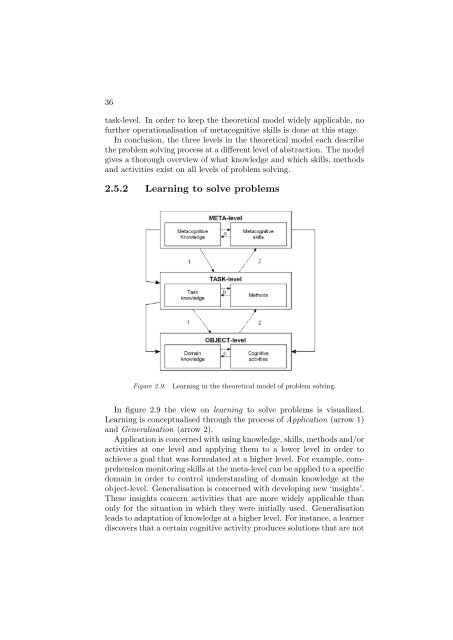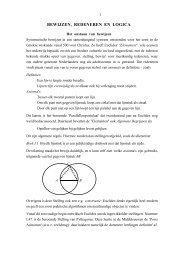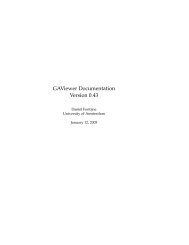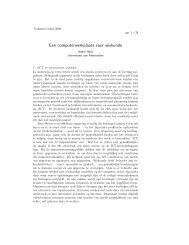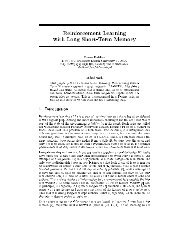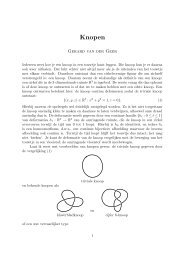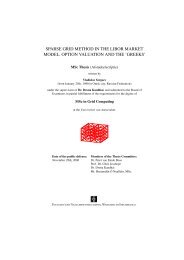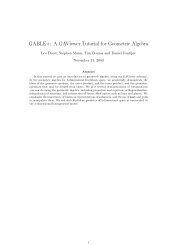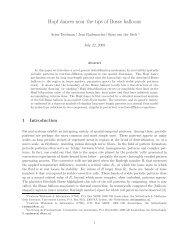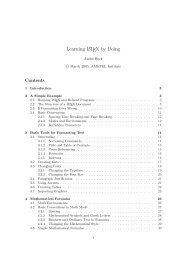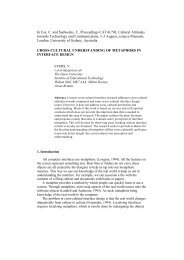The role of metacognitive skills in learning to solve problems
The role of metacognitive skills in learning to solve problems
The role of metacognitive skills in learning to solve problems
Create successful ePaper yourself
Turn your PDF publications into a flip-book with our unique Google optimized e-Paper software.
36<br />
task-level. In order <strong>to</strong> keep the theoretical model widely applicable, no<br />
further operationalisation <strong>of</strong> <strong>metacognitive</strong> <strong>skills</strong> is done at this stage.<br />
In conclusion, the three levels <strong>in</strong> the theoretical model each describe<br />
the problem solv<strong>in</strong>g process at a different level <strong>of</strong> abstraction. <strong>The</strong> model<br />
gives a thorough overview <strong>of</strong> what knowledge and which <strong>skills</strong>, methods<br />
and activities exist on all levels <strong>of</strong> problem solv<strong>in</strong>g.<br />
2.5.2 Learn<strong>in</strong>g <strong>to</strong> <strong>solve</strong> <strong>problems</strong><br />
Figure 2.9.<br />
Learn<strong>in</strong>g <strong>in</strong> the theoretical model <strong>of</strong> problem solv<strong>in</strong>g.<br />
In figure 2.9 the view on learn<strong>in</strong>g <strong>to</strong> <strong>solve</strong> <strong>problems</strong> is visualized.<br />
Learn<strong>in</strong>g is conceptualised through the process <strong>of</strong> Application (arrow 1)<br />
and Generalisation (arrow 2).<br />
Application is concerned with us<strong>in</strong>g knowledge, <strong>skills</strong>, methods and/or<br />
activities at one level and apply<strong>in</strong>g them <strong>to</strong> a lower level <strong>in</strong> order <strong>to</strong><br />
achieve a goal that was formulated at a higher level. For example, comprehension<br />
moni<strong>to</strong>r<strong>in</strong>g <strong>skills</strong> at the meta-level can be applied <strong>to</strong> a specific<br />
doma<strong>in</strong> <strong>in</strong> order <strong>to</strong> control understand<strong>in</strong>g <strong>of</strong> doma<strong>in</strong> knowledge at the<br />
object-level. Generalisation is concerned with develop<strong>in</strong>g new ‘<strong>in</strong>sights’.<br />
<strong>The</strong>se <strong>in</strong>sights concern activities that are more widely applicable than<br />
only for the situation <strong>in</strong> which they were <strong>in</strong>itially used. Generalisation<br />
leads <strong>to</strong> adaptation <strong>of</strong> knowledge at a higher level. For <strong>in</strong>stance, a learner<br />
discovers that a certa<strong>in</strong> cognitive activity produces solutions that are not


